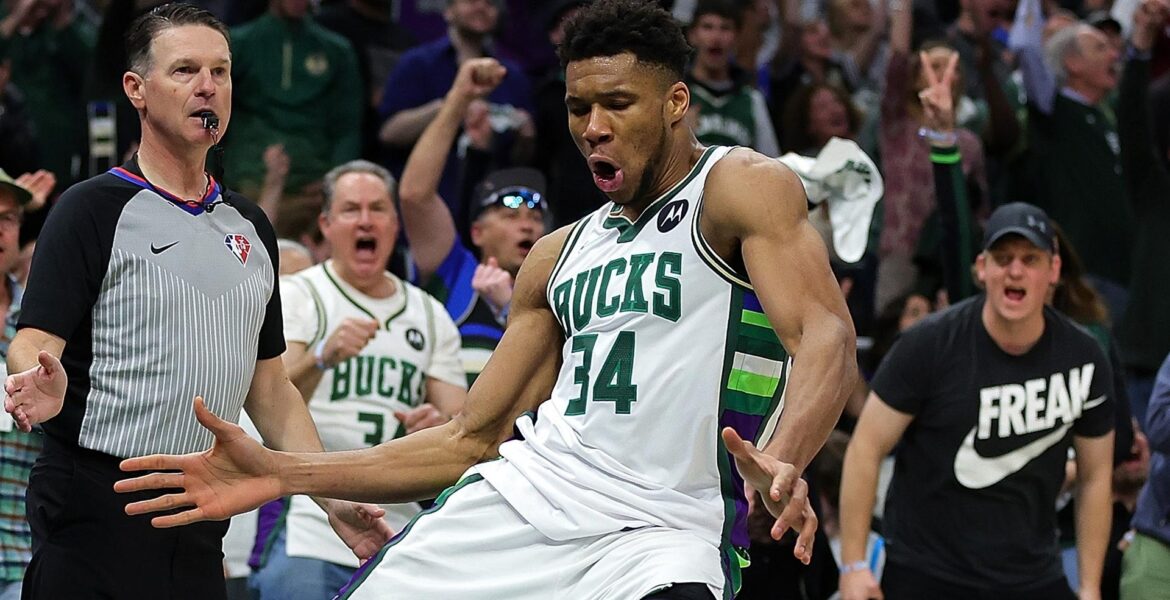Bucks owner Marc Larsy advised the two-time NBA MVP to invest his money in US treasuries and other assets, rather than to spread his wealth across multiple bank accounts because of the FDIC's $250,000 limit.
Having moved stateside from Greece at only 18 years of age in 2013, Giannis, now 28, recalls when he opened half a dozen bank accounts to safeguard his fortune after learning of the standard deposit insurance coverage limit in the US.
'I had no money growing up, so I asked them, ''Is my money safe?''' said Giannis, who's reportedly made $80.9M in earnings since being drafted nearly a decade ago, according to Forbes.
Since February, when Silicon Valley Bank unexpectedly filed for bankruptcy, many consumers have questioned the FDIC's consumer protection strategy and the 'Greek Freak' is no different, confessing that after finding out about the $250,000 cap, he opened accounts at 'five, six, seven' other financial institutions.
Marc Lasry, co-owner of the basketball franchise which has Antetokounmpo on its books - the Milwaukee Bucks - was left baffled when he initially learned of the power forward's numerous bank accounts at the Bloomberg Wealth Summit last year.
Bucks forward Giannis Antetokounmpo initially feared that the US government might take his fortune when he first moved to America from Greece when he was 18 in 2013
Lasry, a hedge fund manager with a particular interest in distressed debt investing, claims that Antetokounmpo's fear of losing his wealth is likely tied to his childhood, which he entirely spent in Greece after his parents immigrated from Nigeria before the star was born.
Greece defaulted on a debt of $1.7B to the IMF in 2015. The financial crisis was largely the result of structural problems that ignored the loss of tax revenues due to systematic tax evasion, leaving the country's citizens in fear of losing their bank deposits.
Seeing his homeland's economy severely suffer has made Antetokounmpo act on Lasry's advice, as the 2021 NBA champion seeks to expand his financial literacy.
'There's way smarter ways to do it, keep your money safe,' the seven-time All-Star told Bloomberg, adding that he's been learning new financial strategies to expand his portfolio since the pandemic.
The 'Greek Freak' is also listed 10th on Forbes' list of the world's best-paid athletes this year
Antetokounmpo has plenty of cash to sit on, having earned $39.9M in salary, while receiving $41M through endorsements, such as Nike, Google, JBL and Meta, per Forbes.
The magazine has the 'Greek Freak' listed as 10th on its list of the world's best-paid athletes, following the fortunes of Lionel Messi ($130M), LeBron James ($121M), and Tom Brady ($84M).
Lately, Antetokounmpo has been venturing off the court to launch his exchange-traded fund (EFT), partnering with investment management firm, Calamos Investments.
The 2021 NBA Finals MVP was on Wall Street on Friday to launch the NYSE-listed fund -- a suite of environmental, social and governance funds.
The bank bail-in explained
As opposed to a bail out, in which a government provides financial instructions with funds to ‘bail them out’ from going under, such as what happened during the Global Financial Crisis (GFC) in America, a bail-in protects financial institutions in a different way.
The bank bail-in explained in Cyprus
In a bail-in, a bank is able to essentially take money from your deposits to bolster its own finances in an emergency situation.
This action did occur in Cyprus during the 2012 – 2013 Cypriot financial crisis, through a one-time bank deposit levy to raise $7.5 billion in needed funds. Deposits with balances below €100,000 were to have 6.75% withdrawn, and 9.9% was to be withdrawn from uninsured amounts above €100,000. Depositors were to be compensated with the equivalent amount in shares with their banks.


